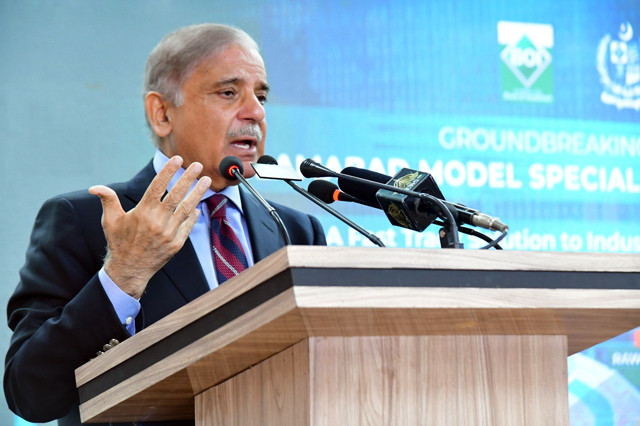
Prime Minister Shehbaz Sharif on Tuesday reiterated his call for national unity on the Charter of Economy during the groundbreaking ceremony of the Islamabad Model Special Economic Zone.
The prime minister emphasised the importance of consistent economic policies to propel the country towards progress and prosperity.
With the recent signing of the agreement with the International Monetary Fund (IMF), Prime Minister Shehbaz expressed confidence that the risks of default had diminished. He emphasised the need for Pakistan to focus on boosting exports to compete effectively with neighbouring states, particularly the eastern neighbour.
During his address, Prime Minister Shehbaz highlighted that the Islamabad Model Special Economic Zone had experienced a delay of five years in its launch. He noted that nine Special Economic Zones were originally planned under the China-Pakistan Economic Corridor (CPEC).
براہِ راست - اسلام آباد: وزیرِ اعظم شہباز شریف کا اسلام آباد ماڈل اسپیشل اکنامک زون کا سنگِ بنیاد رکھنے کی تقریب سے خطاب https://t.co/qJlypcEzlP
— Government of Pakistan (@GovtofPakistan) July 18, 2023
The prime minister blamed the previous government for impeding the SEZ projects and undermining the strong Pak-China ties. He stated that despite finalising the land and designs for the SEZs in Punjab, the previous administration deliberately hindered the projects' progress.
Prime Minister Shehbaz commended the significant Chinese investments, amounting to $30 billion during Nawaz Sharif's tenure, primarily through the CPEC initiative. He emphasised the golden opportunity for Pakistan to learn from China's textile expertise, engage in joint ventures, and import Chinese second-hand machinery to boost exports, particularly as China's industry has become highly advanced.
The prime minister acknowledged the challenges faced by the incumbent government in the last 14 months, including coping with unprecedented floods and record inflation resulting from the Ukraine war. He assured the gathering that after the IMF agreement, the government's main focus would be on boosting the industrial and agriculture sectors.
Also read: Foreign exchange reserves up by $600m, says PM
Prime Minister Shehbaz announced the establishment of a Special Investment Facilitation Council tasked with attracting investments in agriculture, mining, information technology, and export sectors. He emphasised the government's commitment to abide by the IMF agreement, which serves as the foundation for economic reforms.
Drawing attention to Bangladesh's successful $40 billion export of imported cotton, the prime minister urged the nation to learn from past mistakes and strive to overcome challenges. He stressed the importance of attracting investments and getting out of debt, expressing that the Model Special Economic Zone aimed to attract investments from China, UAE, Qatar, and other countries to bring Pakistan on par with its neighbouring nations.
PM Shehbaz also highlighted past issues where SEZs were transformed into development estates, enabling individuals to exploit opportunities for personal financial gain. He emphasised the need to provide land to investors in SEZs on favorable terms, citing the example of Bahawalpur Solar Park, where land was leased out for just $1 to investors to encourage industry establishment while preserving their capital.
The prime minister called for the establishment of a mechanism to cancel lease agreements if investors failed to develop industries within the specified timeframe, ensuring accountability and timely implementation.
Planning Minister Ahsan Iqbal, during his address, mentioned that after 2020, nine industrial zones were agreed upon under CPEC. However, the previous government postponed these projects, resulting in a crisis of decision-making. He praised the incumbent government for prioritising SEZs and reviving stalled projects, with the Rashakai SEZ nearing inauguration.
Prime Minister Muhammad Shehbaz Sharif addresses the groundbreaking ceremony of Islamabad Model Special Economic Zone. pic.twitter.com/o4qUKFMWN1
— Government of Pakistan (@GovtofPakistan) July 18, 2023
Emphasising the execution of the 5E framework, Iqbal asserted that Pakistan had no choice but to increase exports to $100 billion. He regarded SEZs as powerhouses to boost exports and recommended providing land to investors on favourable terms.
Federal Minister for Industries and Production Makhdoom Syed Murtaza highlighted that the establishment of the Islamabad Model Special Economic Zone would address a longstanding demand of Islamabad's industrial community. He mentioned that his ministry had addressed process anomalies related to solar panel imports and that policies for petrochemicals and coal gas would be finalised by July 30.
Murtaza urged the government to leverage Pakistan's cheap labor and create an environment conducive to business ease.
Asad Rehman Gillani, Secretary of the Board of Investment, commended the prime minister's vision of "investors are my masters," which provided strength to execute projects. Gillani emphasised that SEZs would facilitate people-to-people and business-to-business contacts, promoting economic growth.
The Islamabad SEZ, covering 1000 acres of land at the junction of N-5 and Islamabad Expressway, is expected to create approximately 1000 jobs. Gillani added that the low-carbon footprint industry in the zone would attract investments of around $2.5 billion.

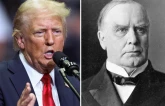


1723807223-0/jimin-(1)1723807223-0-165x106.webp)
1699022668-0/image-800x600-(38)1699022668-0-270x192.webp)
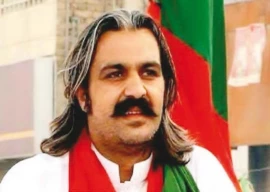
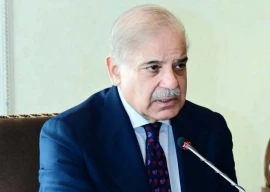

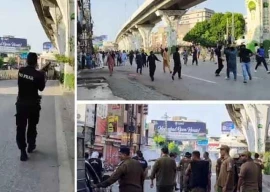
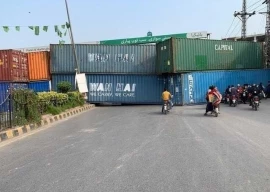


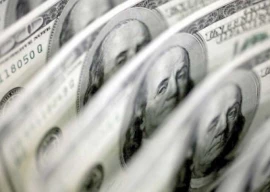







COMMENTS
Comments are moderated and generally will be posted if they are on-topic and not abusive.
For more information, please see our Comments FAQ